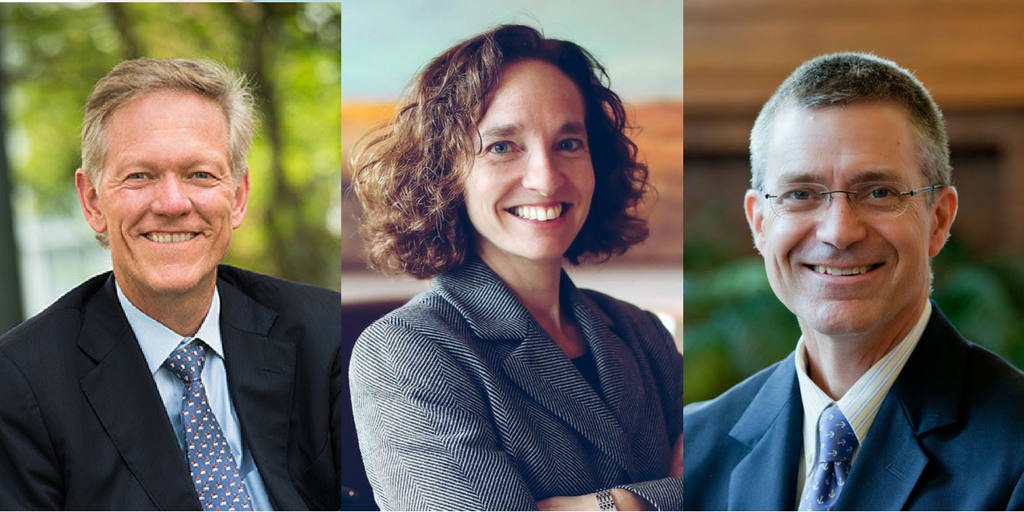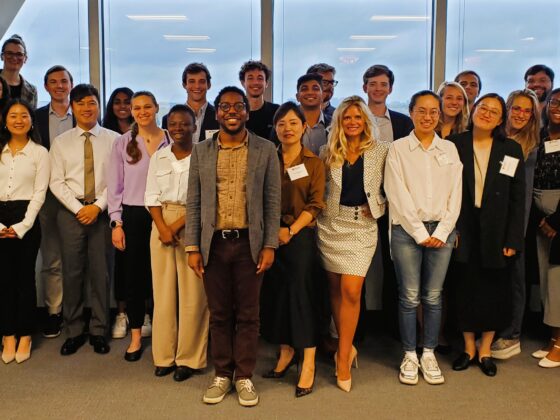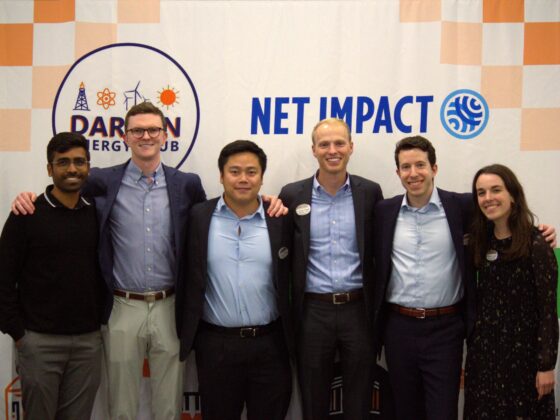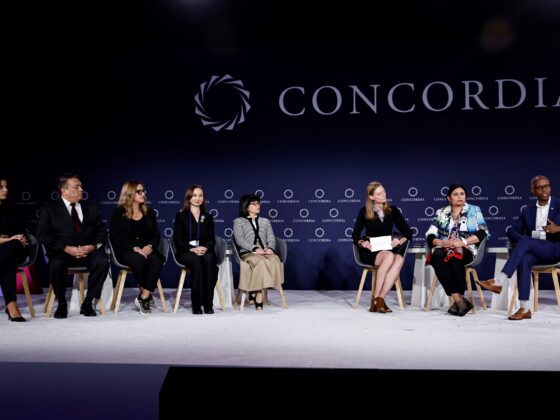By Joyce Lee and Laura Hennessey Martens
Moderator: UVA Executive Vice President and Provost Thomas Katsouleas
Darden School of Business: Dean Scott Beardsley
UVA School of Law: Dean Risa Goluboff
Frank Batten School of Leadership and Public Policy: Dean Allan Stam
Whether addressing humanitarian crises, climate change, or the recent spate of social movements taking place across the United States and around the world, it is clear that strong global leadership is needed now more than ever, and collaboration across different sectors is one of the keys to ensuring open dialogue and effective, long-lasting change.
In a recent panel discussion held at the at the UVA Darden School of Business, Dean Scott Beardsley of the Darden School, Dean Risa Goluboff of the UVA School of Law and Dean Allan Stam of the Frank Batten School of Leadership and Public Policy came together to share their insights on global leadership and the importance of interconnectedness across sectors. The event was moderated by UVA Executive Vice President and Provost Thomas Katsouleas.
The dean’s panel was sponsored by the Tri-Sector Leadership Fellows Program, a cross-university effort designed to explore effective, responsible leadership and the importance of multi-disciplinary perspectives in decision-making. Administered by the Institute for Business in Society, the fellowship brings together prominent global leaders with graduate students and faculty from UVA’s policy, business and law schools for a series of intimate and dynamic discussions. The 24 fellows are graduate students from all three schools, selected through a rigorous and competitive application process.
In each session, the fellows have the opportunity to view a situation or challenge from this leader’s perspective, first-hand. After meeting with a lineup of top leaders from business, government and the social sector, the dean’s panel finished out the year’s sessions.
The panelists shared stimulating thoughts about the biggest global challenges they believe exist today, how the multi-sector theme has factored into their careers and current roles, and provided advice for current and future multi-sector leaders. Professor Mary Margaret Frank, the faculty leader representing the Darden School, provided welcoming remarks and introduced the panelists and Tri-Sector Leadership Fellows to the audience.
Frank highlighted the fact that the Tri-Sector Leadership Fellows program was the “brainchild of a student,” born from an idea by a former Batten and Darden School student who identified a gap and called for more cross-sector knowledge and conversations among graduate students at the business, policy and law schools.
The three deans illustrated the importance of having cross-sector knowledge and perspective as they referred to their career paths and current roles. Pointing out that all of the deans “operate directly at the intersection of business, law and policy,” Dean Stam stated that all leaders must identify the boundaries of what they “must do, can’t do, and the precarious zone of judgement that lies in between the two.” Stam’s experiences in the military taught him teamwork and task accomplishment that he stressed are essential to working with others.
Agreeing with Stam, Dean Beardsley discussed his previous position at McKinsey & Company, where he worked on de-regulation of the global telecommunications industry. He explained that the advent of broadband exposed him to legal and regulatory considerations, causing him to cross into the worlds of law and policy. Explaining the permeability of business, he said “Higher education is a business. You need to recruit talent, oversee budgets, and run an operation.”
“We [deans] are subject to laws and regulations such as Title IX and we need to adhere to these laws,” Beardsley added. He illustrated how higher education is filled with regulations and laws and is subject to the reality of fundraising and budgeting – all requiring cross-disciplinary and cross-sector knowledge and perspectives.
Dean Goluboff, the first female dean of the Law School, said that even as a law student, she was introduced to economic and policy questions in her case studies. As a law professor today, her position allows her to combine shaping law with consulting, teaching and history. “The Tri-Sector idea is also that we don’t only have to be one thing,” she said.
When asked by Katsouleas about the type of knowledge and expertise leaders need to solve problems, Goluboff stated, “the subject matter isn’t important, but when a grand challenge arises, it is harder for a sole individual to solve the issue.” She stressed that more people and ideas are required to resolve such problems, which is why those who have open access to other sectors are more likely to achieve their goals.
On this point, Stam offered future leaders the advice that having a rolodex and network of people from different fields and backgrounds can be helpful to leaders when they need to test assumptions and draw from different perspectives.
“Put in the time to make friends, and make sure that not all your friends are those you would expect to be friends with.”
Watch the full video of the Tri-Sector Leadership Fellows dean’s panel.





